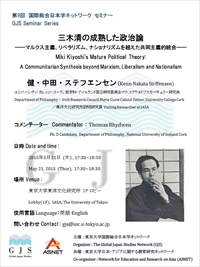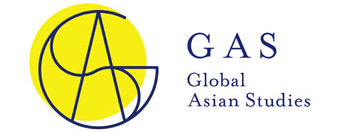第9回GJSセミナー 三木清の成熟した政治論
――マルクス主義、リベラリズム、ナショナリズムを越えた共同主義的統合
| 日時: | 2015年5月21日(木)17:30~18:30 |
|---|---|
| 会場: | 東京大学 東洋文化研究所 1F ロビー |
| 講演者: | 健・中田・ステフエンセン(ユニバーシティ・カレッジ・コーク, 哲学科・アイルランド国立研究委員会マリ・スクウォドフスカ=キュリー研究員/東洋文化研究所訪問研究員) |
| 使用言語: | 英語 |

コメンテーター:Thomas Rhydwen(Ph. D Candidate, Department of Philosophy, National University of Ireland Cork)
講演概要: Considerable controversy surrounds the Kyoto School philosopher Miki Kiyoshi (1897-1945); he has been placed almost everywhere on the political spectrum from Marxian socialism via liberal humanism to fascism. At the heart of the controversy stands his participation in the Shōwa Research Association 昭和研究会 during the second Sino-Japanese war and his authorship of two pamphlets developing the political theory of kyōdōshugi 協同主義, which one might translate as ‘cooperative communitarianism’.
Although it can be considered a consolidation and maturation of his political theory, Miki’s kyōdōshugi has received scant attention in the Japanese literature compared to the earlier phases of his authorship and the unfinished magnum opus, The Logic of Imagination 構想力の論理. Since the late 1970s, there has been a remarkable divergence in the dominant Japanese and Western perspectives, with very different thematic emphases. Some of his Western readers have branded him a collaborationist fascist ideologue, while he has often been considered a ‘philosopher of resistance’ and anti-fascist martyr in Japan. Neither view is borne out by a closer, contextualising reading. One of the most damaging parts of what amounts to an Anglophone ‘black legend’ is the weakly founded, but nevertheless persistent, myth that Miki’s political theory took a European-inspired fascist turn sometime in the late 1930s. This interpretation is based on arguably problematic selective readings of Intellectual Principles for a New Japan 新日本の思想原理 and a relative neglect of its philosophically more significant companion piece, The Philosophical Foundations of Cooperative Communitarianism 協同主義の哲学的基礎. A contextually sensitive and philologically closer engagement with the latter text in particular leads to the conclusion that Miki elaborated a methodologically and normatively communitarian theory, which criticised but built on liberalism, Marxism, and Confucianism to further the construction of a modern East Asian political community.
The presentation will critically outline the debate on Miki’s intellectual trajectory, focusing on the ‘black legend’ of his alleged conversion to fascism. It will argue that in spite of appearances to the contrary, his social and political theorising was characterised by certain underlying continuities and the gradual elaboration and consolidation of a communitarian political theory and structurationist social theory. This prefigured such later communitarian critics of liberalism as Charles Taylor and Alasdair Macintyre, Bourdieu’s and Giddens’ social theories, as well as the postcolonial critique of the political, cultural and intellectual effects of Eurocentrism.
主催:東京大学国際総合日本学ネットワーク(GJS)共催:東京大学日本・アジアに関する教育研究ネットワーク(ASNET)
問い合わせ:gjs[at]ioc.u-tokyo.ac.jp



